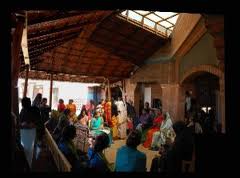 On the matter of working at the clinic, the staff of Sambhavna express very similar feelings. “Working in a social organisation you have a completely different relationship with those who come for care. And in a non-hierarchical workplace you also have a different relationship with your co-workers,” says Biju. Ritesh, another of the community health workers, adds that “it’s like being in a family – there’s no difference, we feel like one big family. When I worked in the National Insurance Agency people always left the minute their work hours finished: here we stay until we are satisfied that our work is finished for the day.” Pranay, who does Verbal Autopsy and data management at the clinic, echoes Ritesh: “if my career had followed my studies I’d be a civil engineer. Here I feel we all benefit from the collective spirit, the sharing of ideas. If I worked somewhere else I think I’d be trying to escape…”
On the matter of working at the clinic, the staff of Sambhavna express very similar feelings. “Working in a social organisation you have a completely different relationship with those who come for care. And in a non-hierarchical workplace you also have a different relationship with your co-workers,” says Biju. Ritesh, another of the community health workers, adds that “it’s like being in a family – there’s no difference, we feel like one big family. When I worked in the National Insurance Agency people always left the minute their work hours finished: here we stay until we are satisfied that our work is finished for the day.” Pranay, who does Verbal Autopsy and data management at the clinic, echoes Ritesh: “if my career had followed my studies I’d be a civil engineer. Here I feel we all benefit from the collective spirit, the sharing of ideas. If I worked somewhere else I think I’d be trying to escape…”
Kamal, the medical dispenser, is evidently proud of the clinic’s ethos: “the clinic staff treat people like fellow human beings. We do a real social service here. Other clinics are vocational; everything is oriented around salaries. I get a lot of satisfaction from being able to help people in their problems.” Mr Chaudhary, who manages and administrates the finances of the clinic, used to be an officer of the Finance Department for the State government: “I’m retired and so have no need to work. You could say I’m making up for my previous work, because in that there was no attempt to serve the people.” And for Dr Deshpande, “it is a very good time, a very precious time in my life. It is a privilege to work here.”
In many ways the four health workers at Sambhavna get the deepest, most extensive contact with those the clinic has been set up to help. Says Diwakar, “when we first started it was like a dream come true because we set up the clinic exactly how we wanted it. Even though money is very scarce we offer four kinds of treatment, six days a week. No government hospital provides so many things: in other hospitals there is only Allopathy.” Ramesh’s daytime health work is combined with being Sambhavna’s sleep-in security guard: “I’m never scared of hard work here because I know that it’s for other people’s benefit. Once I got to know my exact role in Sambhavna I was totally committed – I’m very happy with my work.”
Last words go to Aziza. “This work is different for me. My family is gas affected. I didn’t start working here for a salary, but for the opportunity to do humanitarian work with the poor who needed helping. After 4-5 months, after fully realising the kind of work I am doing, I was so happy for my profession. Once we were doing a survey and we met a woman, 55 years old, who had an infection of the cervix – she had been bleeding for three months. We brought her to the clinic. If we hadn’t done this she would have died. Every time we see her now she smiles and gives us good wishes.
We have many big dreams but our hands are tied because we have to work within limitations. Because all the money is donated we have to be very careful how we spend it. We want to go to the root cause and real pains, so we can help people to the core. If we got proper funds we would be able to do so much more, to reach out to them and touch them – there are lots of dreams.”


